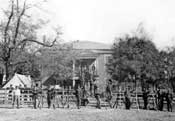Appomattox - Virginia Historic Site

The Virginia town of Appomattox Court House received its name like many other rural counties in the Southern States which had county seats whose names were formed by adding court house to the name of the county. The court house town contained the courthouse building as well as a number of other buildings. One of those other buildings was the McLean house, a former tavern. In 1865, this house became famous for the location of the official end of the Civil War.
By 1865, the Confederate Army had celebrated some splendid victories at the Battles of Manassas, Fredericksburg, Chickamauga and Chancellorsville- but also some humiliating defeats at Gettysburg and Vicksburg. Their supplies- always lean and at risk of being cut off by the Union Army- were dwindling and morale among the troops was trending sharply lower. No longer was Confederate General Robert E. Lee considered invincible- as many of his soldiers felt earlier after his stunning successes against larger and better equipped Union forces. After the devastating loss of the Confederate capital at Richmond, Union General Sherman’s scorched-earth march through the major city of Atlanta and the repossession of New Orleans, Vicksburg and the entire Mississippi Valley by the North, Lee realized that continuing to fight would be futile. Through their firing the first shots of the war at Fort Sumter and more than four years of fighting, the Confederate Army had already set in motion a series of battles which caused overwhelming losses on both sides. By 1865, thousands of southern wives and mothers were still waiting for their boys to come home.
On April 9, 1865 hundreds of troops began arriving at the home of Wilmer McLean in Appomattox, Virginia. McLean’s previous home had sustained a cannonball blast early in the war at the Battle of Manassas. Terrified by that experience, McLean had resolved to find a new home far removed in the countryside “where the sound of battle would never reach them.” Little did he know that four years later his house would be the location for an historic declaration of peace. Union soldiers surrounded his homestead, waiting for their vanquished enemies to arrive. As rebel troops marched up to the house, senior officers in the lead- they received salutes from the Union soldiers, a final act of honor between former combatants. Union General Ulysses S. Grant arrived late. He entered the front doorway, his boots and pants mud-splattered and strolled over to GeneralLee. Lee was immaculately dressed with a red sash and polished brass buckles. Grant shook his hand firmly and they began to discuss the protocol for Confederate surrender which he had outlined for the occasion.
Grant later wrote in his memoirs about the historic meeting, noting “…it was impossible to say whether he (Lee) felt inwardly glad that the end had finally come, or felt sad over the result…” Grant had offered generous terms, along with amnesty for the Confederate Army, a magnanimous gesture considering the four-year long struggle generated a staggering 600,000 casualties, ruineddozens of cities and changed people’s lives forever. Grant knew that even though millions in the North wanted revenge, it would serve no purpose and likely cause the country even more harm. President Lincoln was eagerly hoping for this nightmare to come to an end. So Grant- a former Army drop out who’d been criticized endlessly as a loser, a drunkard and a butcher who slaughtered thousands to achieve his goals- finally gave the country what it desperately needed. The Civil War was over.
Today, Appomattox Court House is a National Historic Park where visitors can review artifacts in the McLean house and documentaries in the theatre.
